
17 minute read
Awards and PrIzes
Research and Innovation at Maynooth University
Technology transfer, enterprise Partnerships and commercialisation
In 2019 Avectas, spun out of Maynooth University in 2011, raised its single largest investment of $10 million. This brings the total raised so far for its ground-breaking cell therapy technology to over $20 million. This latest round was led by leading pharmaceuticals investor Seamus Mulligan and is expected to fund the company to the point where its technology will be positioned for clinical trials. Avectas expected to add to its 24 staff following the new investment. Avectas is working on cell engineering technology that allows cells to be taken from people, who are often critically ill, and returned to them after they have been genetically engineered to address their illness.
Avectas supplies the delivery technology and the advanced therapeutic molecules will come from the various drug companies with which they are working. In this way, Avectas’ is one of the leading cell engineering companies in personalised medicine. Avectas’ Solupore® technology increases cell permeability in a way that is gentler on the cells and more cost efficient than rival approaches. It also means the engineered cells can be returned to the host patient more quickly.
Spin-out company Avectas has raised $20 million for its ground-breaking cell therapy technology
Maynooth University and Intel Ireland signed a Memorandum of Understanding (MoU) to establish a strategic partnership for research and innovation, and to nurture future talent. Building on already strong relationships between Intel and Maynooth, the MoU will establish a more comprehensive and structured format for creative collaborations in key areas of research.
The agreement signed by Maynooth University President, Professor Philip Nolan, and Eamonn Sinnott, General Manager of Intel Ireland and Vice President Technology Manufacturing Group, marked a new chapter in the relationship between Ireland’s fastest growing university and the global leader in manufacturing and technology. As a commitment to developing the relationship between two major employers and contributors to enterprise, research and education policy, the MoU offers the potential for Intel and Maynooth to enhance their strategic presence in the fastest growing demographic region of Ireland by working in a more comprehensive and structured format.
The two organisations will co-operate to identify, optimise and nurture research and innovation in areas of growth potential, such as Maynooth’s U-Flyte project on Unmanned Aircraft Systems (cofunded by SFI and industry partners), artificial intelligence, design and innovation.
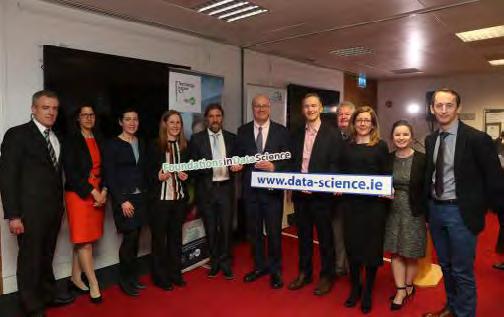
The partnership will also seek to explore ways to work together on topics such as emerging skills and talent needs, and extending diversity in education, including the representation of women in STEM- related education programmes and STEM careers.
Maynooth University continues to be an important collaborator in the SFI Research Centres. These collaborations are an important way for the university to build strong collaborative relationships with industry. Companies who started new centre projects this year include Nokia, Dense Air and ESBi.
Our collaborations with industry were further enhanced with the creation of the Centre for Research Training in Foundations of Data Science in collaboration with UCD and UL and funded by SFI. This centre is focused on training a cohort of PhD students with a world-class foundational understanding of the horizontal themes of Applied Mathematics, Statistics and Machine Learning. 30 Industry partners, 10 of which will work directly with Maynooth University will collaborate and cooperate in this training by hosting students on short term placements.
Pictured at the launch of the SFI Centre for Research Training in Foundations of Data Science, Professor Brendan Murphy, Dr Sinead O'Doherty, Dr Caroline Brophy, Dr Norma Bargary, Professor Ken Duffy, Professor Mark Ferguson, Professor James Gleeson, Gerry Doyle, ICT Skillnet Ireland, Associate Professor Claire Gormley, Dr Sinead Burke, Professor Nial Friel
awards and Prizes
a number of maynooth unIVersIty researchers were recognIsed for theIr contrIbutIon by external awards In 2018/19, and we are Proud to acknowledge these, whIch reflect the excellence of the unIVersIty across the full sPan of Its facultIes.

awards and Prizes in 2018/2019
aPPoIntment to the councIl of state
dr mary murPhy
dr gerard mccarthy
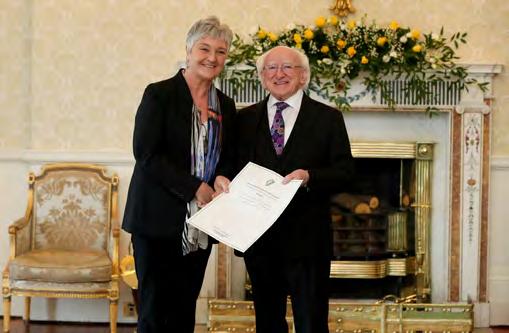
Dr Mary Murphy, Department of Sociology

Dr Mary Murphy was appointment by President Michael D Higgins to the Council of State. She was presented with a warrant of appointment as an incoming Member of the Council of State by President Michael D Higgins at an official event in Áras an Uachtaráin.
Dr Murphy, a senior lecturer in Irish Politics and Society in the Maynooth University Department of Sociology, was among the seven new appointees to the consultation body of the President, which was established under the Constitution. Dr Gerard McCarthy of the ICARUS Climate Research Centre and Department of Geography was awarded the prestigious Early Career Scientist medal by the International Association for the Physical Science of the Oceans. The IAPSO Early Career Scientist Medal honours Early Career Scientists for their outstanding research in the physical or chemical sciences of the oceans, and for their cooperation in international research.
In December 2018, funding of €2 million for a major project led by Dr McCarthy on Atlantic climate change was announced by the Marine Institute and the European Regional Development Fund. The Atlantic climate change project funded by the Marine Institute and the European Regional Development Fund will bring the field of ‘decadal climate prediction’ to Ireland. This emerging field will lead to improved estimates of the future climate over the period of a decade by using the predictability of the ocean.
The International Association for the Physical Sciences of the Oceans (IAPSO) is one of eight associations of the International Association of Geodysey and Geophysics, which is part of the International Council for Science.
Dr Gerard McCarthy, Department of Geography, and Professor Philip Nolan, President of Maynooth University
awards and Prizes in 2018/2019
IrIsh research councIl early career researcher of the year award
dr karen englIsh
maths week Ireland award
Professor anthony o'farrell and dr fIacre Ó caIrbre

Dr Karen English, Department of Biology
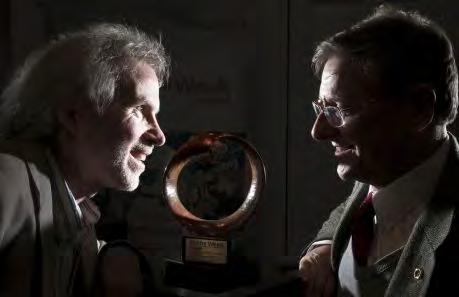
Dr Karen English won the Early-Career Researcher of the Year Award of the Irish Research Council (IRC). Dr English was presented with the IRC Award in recognition of her research on developing ‘calming’ cells in therapies for inflammatory conditions such as asthma, and for immune system disorders, such as organ transplant rejection.
Dr Karen English is an alumna of Maynooth having graduated three times from this university with BSc, MSc and then PhD in 2008. She subsequently was awarded a Marie Curie Fellowship to carry out her postdoctoral training at the University of Oxford (20092011) before returning to Maynooth University, first as a Health Research Board Translational Medicine Research Fellow and later as a Science Foundation Ireland Starting Investigator. She was appointed as a Lecturer in the Biology Department in 2015, and in 2018 is one of just 36 academics in Ireland, across all fields of research, to be awarded an Irish Research Council Laureate Award to progress her work.
Dr English is a Principal Investigator at Maynooth University’s Department of Biology and head of the Cellular Immunology Lab. Professor Anthony O’Farrell and Dr Fiacre Ó Cairbre, were honoured with the Maths Week Ireland Award for their contribution to raising public awareness of maths. The annual award is presented during Maths Week Ireland, the world’s largest festival of maths and numeracy.
Professor O'Farrell founded the annual Hamilton walk in 1990 and Dr Ó Cairbre has now run it for many years. The walk celebrates the day, October 16, and the route taken by William Rowan Hamilton one of the world’s most outstanding mathematicians, who discovered quaternions in a stroke of inspiration while walking along the banks of the Royal Canal in Dublin. His discovery changed the future of mathematics. Hamilton scratched his formulas for the quaternions into the wall at Broome Bridge, Cabra.
Maths Week Ireland is funded through the Science Foundation Ireland Discover Programme, the Department of Education and Skills, Matrix (the Northern Ireland Science Industry Panel), ESB and Xilinx, and co-ordinated by Calmast, Waterford Institute of Technology’s Stem Outreach Centre.
Dr Fiacre Ó Cairbre, Department of Mathematics, and Professor Anthony O’Farrell, Professor Emeritus
awards and Prizes in 2018/2019
dr chandana mathur
anthroPologIcal assocIatIon of Ireland award
dr abdullahI el‑tom
Dr Chandana Mathur, Department of Anthropology
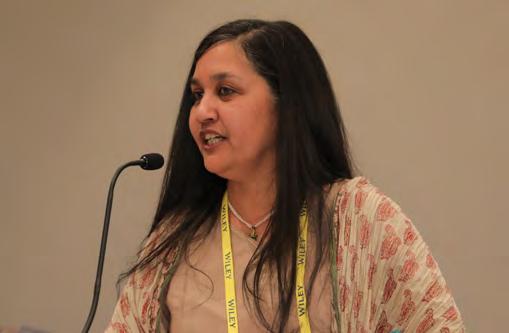
At the November 2018 American Anthropological Association Annual Meeting at San Jose, Dr Chandana Mathur received the prominent AAA Presidential Award for her leadership in uniting global anthropology under the World Anthropological Union (combining the World Council of Anthropological Associations and the International Union of Anthropological and Ethnological Sciences). Dr Abdullahi El-Tom was awarded the 2019 AAI Award in acknowledgement of his contribution to the building of the Anthropological Association of Ireland (AAI).
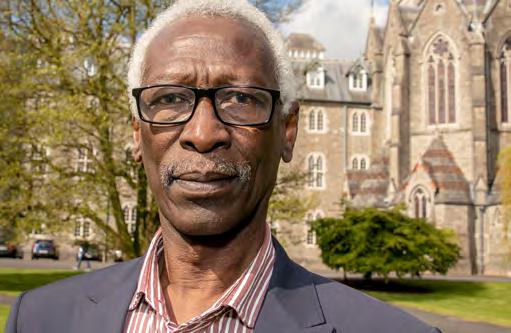
Dr Abdullahi El-Tom, Department of Anthropology
awards and Prizes in 2018/2019
Professor moynagh
dePartment of bIology

Professor Peter Kennedy, President of the Royal Irish Academy and Professor Paul Moynagh, Department of Biology and Kathleen Lonsdale Research Institute for Human Health
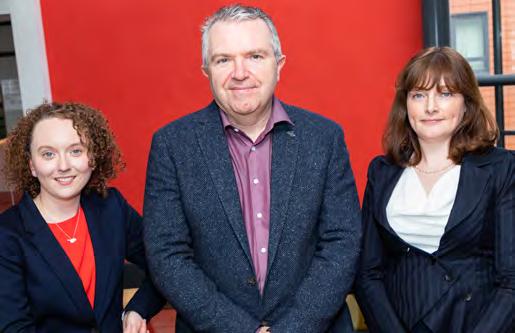
Professor Moynagh, who is Head of the Department of Biology and Director of the Kathleen Lonsdale Institute for Human Health Research, became one of 27 new members of the RIA, and one of 10 new members admitted from the Sciences in 2019.
Professor Moynagh has published extensively in the area of immunology-related research. In 2009 he was awarded the NUI Centennial Prize for Academic Publishing in Medical and Health Sciences and he is the recipient of the 2014 Irish Area Section Biochemical Society (IASBS) Medal. He is a Science Foundation Ireland (SFI) Principal Investigator. His research focuses on delineating the roles of Pellino proteins in immunity.
The Academy has been honouring Ireland’s leading contributors to the world of learning since its establishment in 1785. The Department of Biology has achieved an Athena SWAN Bronze Award, which recognises work undertaken to advance gender equality for staff and students at departmental level.
Biology is the first department at Maynooth University to apply for, and achieve, Athena SWAN accreditation, which is overseen by Advance HE.
The 39 items in the Biology action plan include:
> Establishing a voluntary mentoring programme for all academic and research staff, with a specific focus on women’s careers.
> Embedding gender equality issues into the Department’s Quality
Assurance and Quality Enhancement processes.
> Hosting an annual Phyllis Clinch Lecture to further enhance the visibility of women role models in the global discipline of Biology.
> Amending the annual PhD progress review to include sections on work-life balance and career development.
Claire McGing, Athena SWAN Project Officer, Maynooth University, Professor Paul Moynagh, Department of Biology and Dr Karen English, Chair of the Biology self-assessment team
> The Department of Biology also will seek to align departmental, institutional and sectoral work on the advancement of gender equality in STEM.
The Biology self-assessment team (SAT) includes representation from academic, research, administrative and technical staff, and postgraduate and undergraduate students.
awards and Prizes Maynooth University researCh aChieveMent awards
terahertz sPace oPtIcs grouP: Professor anthony murPhy, dr creIdhe o’sullIVan, dr neIl traPPe and dr marcIn gradzIel
Dr Neil Trappe, Dr Creidhe O’Sullivan, Professor Philip Nolan, Dr Neil Trappe and Dr Marcin Gradziel and Professor Anthony Murphy, Department of Experimental Physics
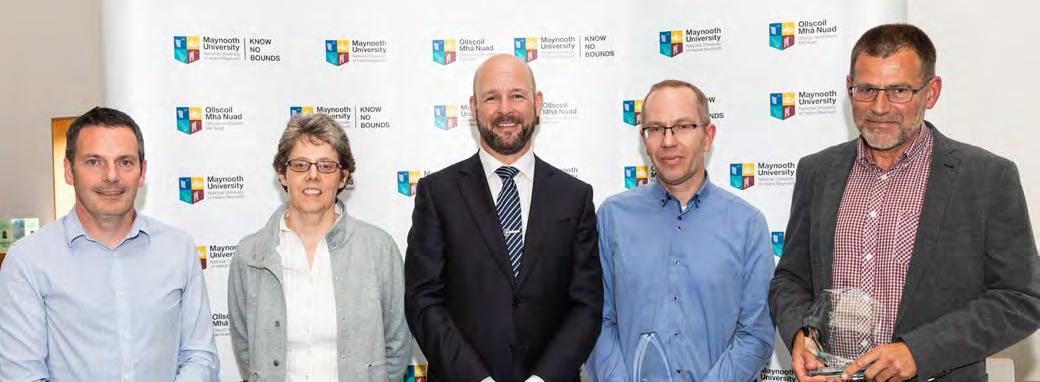
The 2019 winner of the MU Research Achievement Award was awarded to the Terahertz Space Optics Group: Professor Anthony Murphy, Dr Creidhe O’Sullivan, Dr Neil Trappe, and Dr Marcin Gradziel.
The Space Terahertz Optics group in the Experimental Physics Department has internationally recognised expertise in millimetrewave optics, electromagnetics, instrument qualification and astronomical observation. They are core team members of a number of world leading astronomical projects including ALMA, the ESA Planck Surveyor and Herschel Space Observatory. The research group formed by Professor Anthony Murphy currently includes 4 academic staff and 6 research students working in optical design, analysis and measurements for current international projects such as QUBIC (a Q&U Bolometric Interferometer for Cosmology) and a spectrometer instrument called SAFARI for a future satellite mission SPICA (Space Infrared telescope for Cosmology and Astrophysics) for the ESA Cosmic Vision 20152025 programme. As well as astronomical imaging, the group are also investigating terrestrial applications of terahertz technology through their terahertz Vector Network Analyser test facility. Each group member has been PI on individual research grants as well as collaborators on joint awards. Over the last twenty years the space optics group has made a number of major contributions to the development novel astronomical instrumentation for the far-infrared and submillimetre wavelengths that have enabled detailed cosmological measurements and observations that were impossible only a few short years ago. Because of their particular expertise in long wavelength optical modelling the members has been key participants of the instrument development teams for a number of ground based and space based projects. This includes the European Space Agency Planck satellite (operational 2009-13) and the Herschel Space Observatory (2009- ), for both of which projects Murphy was a Co-Investigator.
In 2018 the Planck Satellite Team was awarded the prestigious Gruber Cosmology Prize at the XXX General Assembly of the International Astronomical Union. The Gruber Cosmology Prize is awarded annually to honour a leading cosmologist, astronomer, astrophysicist or scientific philosopher for theoretical, analytical, conceptual or observational discoveries leading to fundamental advances in our understanding of the universe. Professor Murphy was a named co-investigator along with 350 other international scientists on the team awarded the prize, and specifically was a coinvestigator for development of the high frequency instrument (HFI) on board the satellite.
awards and Prizes Maynooth University researCh aChieveMent awards
faculty of arts, celtIc studIes and PhIlosoPhy research achIeVement award
Professor PatrIcIa Palmer
Professor Patricia Palmer, Department of English
The 2019 award went to Professor Patricia Palmer of the Department of English. She graduated with an MA from University College Cork after which she worked in Athens and Brussels before taking a D.Phil. in English literature at the University of Oxford. She was Senior Lecturer in the University of York (2000-2008) and Reader in King’s College London (2008-2016) and took up the chair of Renaissance Literature in Maynooth in 2017.
Professor Palmer is a leading researcher in the fields of early modern literature and culture and in Irish Studies. Her work on language and imperialism is pioneering in finding ways to give voice to the historically voiceless and to expand the parameters of how Ireland has been understood, historically and culturally. In this context, her insights into the relationship between violence and the aesthetic have been particularly keen and challenging. Her work is the first large-scale attempt to unify the field of early modern Irish studies by bringing together the materials, across disciplinary and linguistic boundaries, for an integrated overview of the period. Her latest research, on cultures in conflict in Renaissance Ireland, the subject of her book ‘Darkness Echoing: Cultural Encounters in Renaissance Ireland’ (in preparation), forms the basis for her Advanced Laureate Award funded by the Irish Research Council in 2019, which aims to map the full range of cultural activity across languages and ethnic groups in Ireland from the mid sixteenth to the late seventeenth century. She is also Principal Investigator on the MACMORRIS Project, a four-year DH project which seeks to map the full range of cultural activity, across languages and ethnic groups, in early modern Ireland.

awards and Prizes Maynooth University researCh aChieveMent awards
early career researcher of the year
dr gerard mccarthy
Dr Gerard McCarthy, Department of Geography and ICARUS Climate Research Centre, and Professor Philip Nolan, President of Maynooth University

Dr Gerard McCarthy, Department of Geography and ICARUS Climate Research Centre was the winner of the overall early career award in 2019.
Gerard is an oceanographer working in ICARUS and lecturer in the Department of Geography at Maynooth University. Gerard previously worked at the National Oceanography Centre in Southampton, UK, where he worked with the RAPID team measuring the Atlantic Meridional Overturning Circulation.
His research interests are in the role of the ocean in climate and how that might change with climate change. Gerard was recently awarded €2 million in funding from the Marine Institute and the European Regional Development Fund for a major project on Atlantic climate change. Guided by the goals of the Government’s national marine strategy ‘Harnessing Our Ocean Wealth’ and the ‘National Marine Research and Innovation Strategy 2017 – 2021’, the international ‘A4 Project’ marks a substantial investment by the Marine Institute in physical oceanography and climate change research in Ireland, and aims to improve the understanding of the links between trends in Atlantic temperatures and climate change. In addition, he also been involved with European Commission funded projects: THOR (FP7, named researcher), NACLIM (FP7, Institute PI), and the ongoing Blue-Action (Horizon 2020, Institute PI and Work package Leader). Since finishing his PhD in 2011, Gerard has published over 30 papers in peer-reviewed journals. He has an h-index of 18, an i-10 index of 21, and a Research Gate score of 29.85. His work has been cited over 1400 times, with annual citation numbers increasing year-on-year to over 390 citations in 2018 (Google Scholar). He has consistently published in high impact journals, including a lead author publication in Nature (IF=41.6) in 2015. He is a senior author on 4 out of his 5 most highly cited papers (3 lead author, 1 second author), all of which are ranked in the top 1% most highly cited in the field of Geosciences based on age (Web of Science). Since joining Maynooth University in late 2017, he had had 9 peer-reviewed publications in 2018, including a lead author publication in Geophysical Research Letters (IF=4.3) and second author publication in the Bulletin of American Meteorological Society (IF=7.9). He was also invited to contribute a News and Views article to Nature, published in summer 2018.
awards and Prizes Maynooth University researCh aChieveMent awards
faculty of scIence and engIneerIng – dr ozgur bayram
dr ozgur bayram
Dr Ozgur Bayram, Department of Biology and Kathleen Lonsdale Institute for Human Health Research and Professor Philip Nolan, President of Maynooth University

Dr Ozgur Bayram, of the Department of Biology and Kathleen Lonsdale Institute for Human Health Research won the early career research achievement award in the Faculty of Science and Engineering. He received an MSc in Molecular Biology in Uludag University in Turkey and his PhD in Microbiology from the Institute of Microbiology and Genetics in Georg-August University in Germany before joining the Department of Biology in Maynooth in 2014.
His research interests are in fungal secondary metabolites including food contaminating mycotoxins. He takes an innovative approach to examine food contamination due to global warming, which combines molecular biology and quantitative proteomics, and has significant potential to combat fungal pathogenesis as a result of fungal disease, and food contamination. A key impact of his research will be on human and animal health as his discoveries are leading to new strategies to combat opportunistic human and animal fungal pathogens. Secondly, the impact of climate change on food safety and security consequent of altered patterns of mycotoxin production by fungi will be enhanced by his efforts and expertise. Since contamination of human and animal nutrients with fungal mycotoxins is a major issue for food safety and security, prevention of such contamination will allow us to feed the increased human population in a safe manner to global warming, average global temperatures will increase in the next 30-50 years, which will lead to an increase in fungal growth and therefore mycotoxin production in human and animal feed.
He holds a Career Development Award from Science Foundation Ireland and has published more than 40 peer-reviewed research papers with more than 2000 citations and an h-index of 20. He recently published in Developmental Cell, Plos Pathogens, MBIO and Genome Biology.










